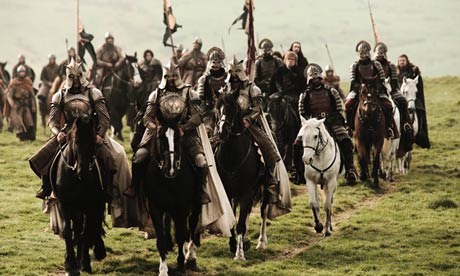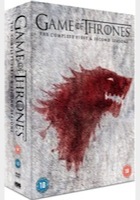As the epic fantasy returns to TV, historian Tom Holland explains how it plunders real events from the ancient world to the middle ages to produce a heady cocktail of drama

Game of Thrones … the back story clearly derives from the wars of the roses. Photograph; Nick Briggs
SPOILER ALERT: This article discusses events in Game of Thrones that may spoil the viewing for those catching up on box sets.
Although Hilary Mantel is apparently yet to begin the third volume of her trilogy of novelsabout Thomas Cromwell, we can be confident of several plot twists that it will not feature. Cromwell will not precipitate a civil war. He will not betray the husband of his foster-sister, with whom he is in love. He will not escape the executioner's block. His downfall is scripted. The history books cannot be cheated. Mantel's Cromwell is as bound to the inevitability of his doom as any prisoner to a rack.
In the hands of a great writer, of course, the fact that we already know a character's fate can serve to heighten rather than diminish tension. For all that, though, the pleasure to be had in following a narrative and not knowing what will happen is a primal one. Next week sees the return to our television screens of a series that, like Mantel's two Tudor Booker prize winners, charts the pleasures and perils of political ambition. In a trailer for Game of Thrones, the voice of the actorAiden Gillen can be heard defining chaos as a ladder: "The climb is all there is."
Gillen's character, Petyr Baelish, certainly knows whereof he speaks. The world he inhabits is one that will seem perfectly familiar to readers of Wolf Hall: courtly, treacherous and full of people having their heads chopped off with axes. Politics is portrayed as a game, in which only the most skilful can hope to win. Baelish himself has risen from humble beginnings to a position of understated influence and power. In the first series of Game of Thrones, he is shown serving a warrior king gone to seed and oppressed by serious marital problems. Baelish's talent is for keeping his spendthrift master in cash. "Within three years of coming to court he had been made master of coin and a member of the small council, and today the crown's revenues were 10 times what they had been under his predecessor."
If Baelish sounds more than a little like Thomas Cromwell, then perhaps that is not entirely a coincidence. He may inhabit a world, Westeros, which features dragons, walking corpses and a 700ft wall of ice – yet it is far from wholly fantastical. George RR Martin, whose series of novels inspired the HBO drama, has woven a tapestry of extraordinary size and richness; and most of the threads he has used derive from the history of our own world.
Gillen's look in the TV series, complete with black doublet and pointed beard, serves the viewer as convenient shorthand for the role he is playing in the drama: that of a Tudor Machiavel. Cromwell and Walsingham are not the only models for this. Baelish's character is inspired as well by the traditions of revenge tragedy: he has a taste for poison and nurtures a semi-incestuous passion for his foster-sister. What neither the history nor the literature of the Tudor period can reveal to us, though, is the full depth and nature of Baelish's schemings – nor, because there are still two books of the series to be written, what his fate will be.


No comments:
Post a Comment